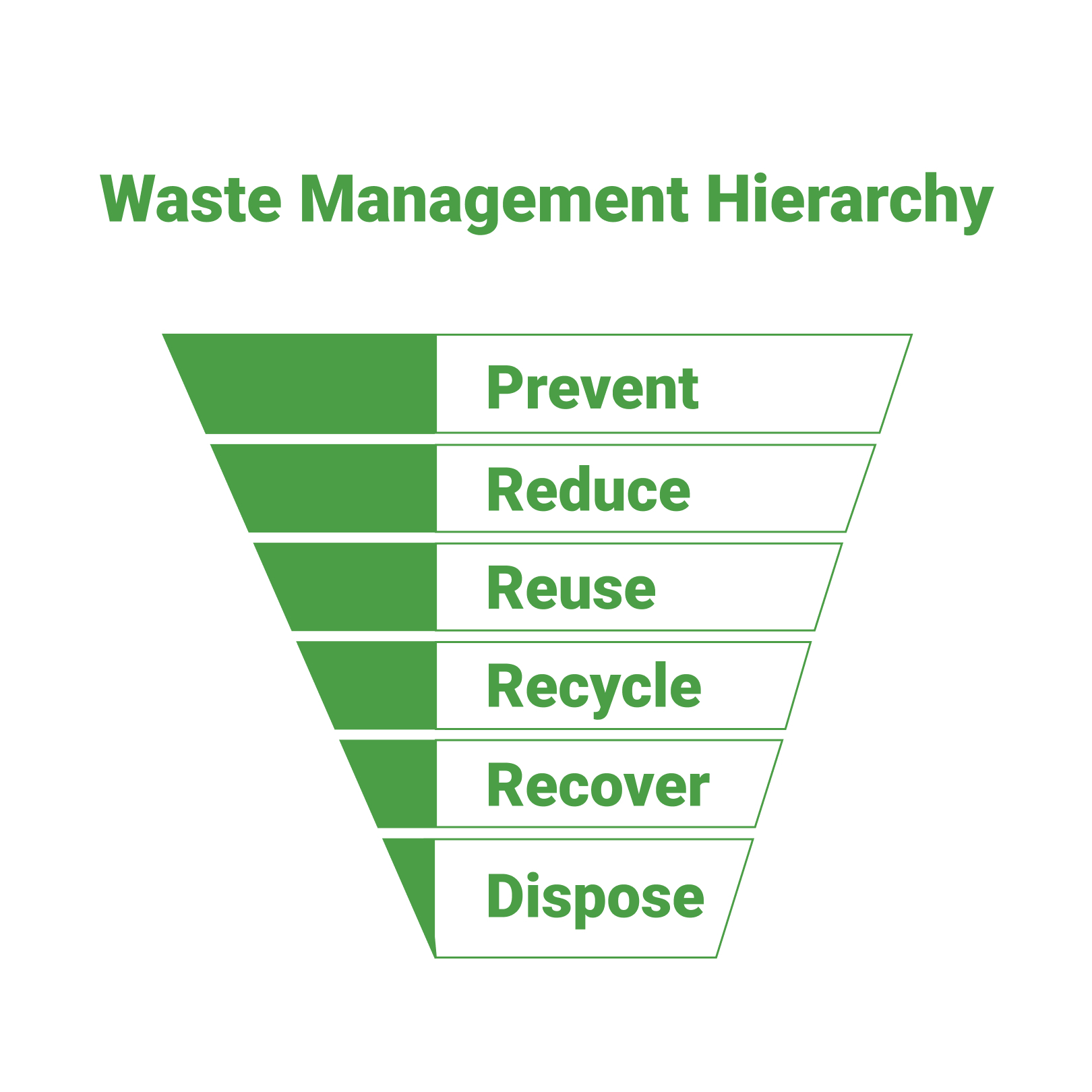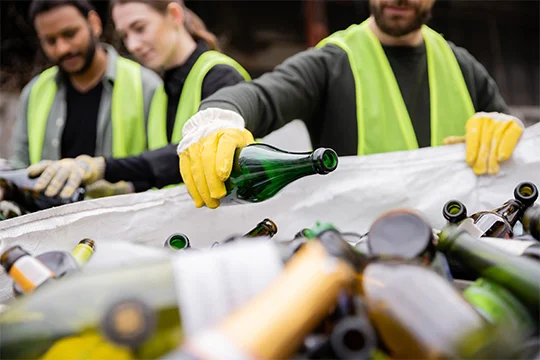Waste management refers to any system dealing with how all garbage and trash are safely and effectively disposed of. It’s quite a large field, given the various types of waste that exist, as well as the numerous disposal methods.
It is important that waste management systems exist. Without them, waste does not go away. Rather, they are left in a sort of lurch state and usually rot in an ineffective manner that is harmful to human health and the environment.
But how have these systems come into being? Are there ways to improve them? And what can I do as a business owner or a household to ensure my waste is properly handled?
This blog explores these questions. It dissolves the complexity of waste management systems and explains them so that regular citizens can better understand the systems. While its focus is on the Australian systems, many of its topics are relevant across the globe.
Waste Management Defined
Waste management is a streamlined process that organises various forms of garbage and trash. It does this through sorting, disposing, reducing, recycling, reusing, and preventing different forms of waste.
These five waste management systems, sorting, disposing, reducing, recycling, reusing, and preventing, ensure that unwanted materials are given an end-life that is safe for human health and the environment.
Sorting Waste
Sorting waste involves separating the different types of waste into their respective parts. This could involve separating recyclable materials from valuable metals or hazardous waste from non-hazardous waste.
Disposing of Waste
Disposing of waste might appear to be the simplest form of waste management, but this is far from the case. Modern waste management systems have different disposal methods, resulting in nuanced approaches and expertise.
Reducing Waste
Perhaps one of the most surprising waste management techniques is reducing waste. Surprisingly, waste management companies are often the best place to start. Their personnel can help right at the manufacturing stage to reduce potential waste-causing features.
Recycling Waste
Recycling waste has become a popular and sustainable waste management practice in the modern industrial world. It deserves its praise as it remains an effective way to prevent overflowing landfills and dumpsites.
Reusing waste
Different from recycling, reusing waste involves finding new lives from garbage and other trash, whether industrial waste or household waste. It does involve some ingenuity, so waste management companies can help.
Waste management systems exist whether a company or household realises it or not. Like any logistics, getting on top of it is essential to running an efficient and effective business.
Waste audits are a great place to begin. Interested in having your waste management systems understood? Consider having it audited by a professional waste management company like Cleanway.
Why is Waste Management Important?
Waste management is important because waste exists whether a person likes it or not. Without effective systems in place to deal with it, there will be piles and piles of unaccounted-for waste and other garbage.
Not only will this be unsightly, but it will also contribute to greenhouse gases and other pollutants. For the beauty and security of planet Earth, waste management is important.
Different Types of Waste
Waste management deals with a large pool of waste. It’s worth naming and defining some of the major types.
- Organic Waste. This refers to naturally forming waste without human-made chemicals and other hazardous materials. That being said, organic waste can be hazardous waste.
- Food Waste. This is all of the food scraps produced by households, restaurants, and other waste generation hotspots.
- Medical Waste. This refers to the waste produced in hospitals, laboratories, clinics, pharmacies, and other facilities that deal with medical or biological equipment.
- Household Waste. This includes everything produced in a household. It includes both liquid and solid waste. Single-use plastics are a major contributor.
The Waste Management Hierarchy
How does a waste management company decide what type of waste needs to be dealt with first? The answer: they use the waste management hierarchy.
This is a theoretical framework that provides guidelines that benefit both individual and organisational waste management teams. It helps to ensure that the management process is environmentally friendly and that more waste is not produced unnecessarily.

The waste management hierarchy focuses on resource recovery and overall waste prevention. Primarily, this entails reducing the environmental impact at the production state. Landfill activities don’t need to be as regular if there’s nothing to go in it in the first place!
Waste Management in Australia
Waste management in Australia reflects the country’s diverse economy. It involves interventions of federal, state, and local governments, often working with private sector companies like Cleanway.
Australia’s National Waste Policy is aligned with international waste management best practices. It seeks to manage waste through the five mechanisms of sorting, disposing, reducing, recycling, and reusing.
Historical Development
Early forms of waste management in Australia existed amongst the settlements of First Nations People. A key characteristic of waste is that it forms whether or not a system of management exists. Early humans knew this and structured waste management systems into their everyday lives.
The arrival of European colonists had waste management take on a Western and starkly European form. Much of these methods aligned with colonial society and their own views on nature and their place within it.
During the second half of the nineteenth century, advances in sanitation and technology saw waste become an issue that needed new ideas. Cities like Sydney and Melbourne were growing, and they were in need of effective ways to manage all of their waste.
Current Management System
Australia’s current waste management systems align with global best practices. That being said, it still retains some local practices that serve some of the unique challenges faced in this part of the world.
The system is run at a local, state, and federal level, but the private sector plays a big part, too. Waste management companies like Cleanway help to keep the waste streams functioning and step in with expertise and guidance where the government cannot.
International Relations
Australia is not a waste produced by itself. It exists within a global sphere of waste-producing countries and global companies. For this reason, its waste management systems must align with other global trends.
Additionally, in recent years global waste management efforts have turned to finding more sustainable and eco-friendly solutions. This involves more than just reducing greenhouse gas emissions.
Countries around the world sign green treaties that focus on creating greener solutions to waste and other forms of garbage. This points towards a global effort to reduce gross waste produced.
Australia’s government has signed the following conventions:
- Basel Convention
- Waigani Convention
- Stockholm Convention
- Rotterdam Convention
- Vienna Convention
- Montreal Protocol
- Kyoto Protocol
- Minimata Convention
- London Convention
- MARPOL
Possible Futures
How waste management systems continue to evolve in the future is anyone’s guess, but there are certain trends that can be seen from history.
Additionally, it is unlikely that efforts to lessen the effects of climate change will diminish. We can make a certain degree of suggestions on the possible future of waste management in Australia.
For one, it is very likely that technology will continue to play in part in how waste is produced and in how it is managed. It is at an interesting intersection of both producer and dealer and has been for years.
The rise of computer technology revolutionised the logistics of waste management. The optimisation potentials of AI are slowly being realised. This will likely have an impact on waste management systems in the near future.
Key Challenges for Waste Management in Australia
There are a number of challenges that waste management companies face in Australia. In many ways, the industry’s ability to overcome these challenges highlights its commitment to safe and effective waste management.
- Community Trust. Waste management companies across Australia need the trust and support of local communities.
- Recycling. Without recycling being common and practised, efforts to reduce total waste will be in vain.
- Education. Australian schools have a duty to educate young learners about safe and effective waste management solutions. This will help to develop a citizen pool of people who care about waste.
- Regulatory Compliance. Effective waste management can sometimes get bogged down by bureaucratic regulatory compliance, slowing down innovation.
- Local Markets. Without local markets doing their bit to engage waste management companies, the industry will not develop or grow into an effective business model.
CSIRO has a blog that unpacks many of these challenges.
Waste Management Initiatives
Waste management companies across Australia continue to develop their waste management systems in order to provide adequate and effective waste management.
A key feature of this has been improved efforts to curb climate change and greenhouse gas emissions from poor waste systems.
Whenever choosing a waste management company, be sure to take into account how their company fares against both local and international waste management laws and regulations, as well as their commitment to ethical and environmentally friendly practices.

